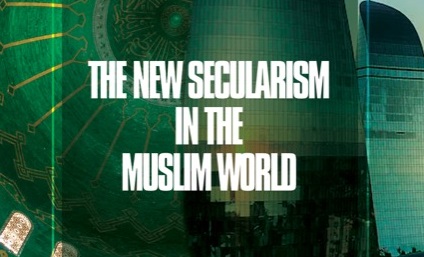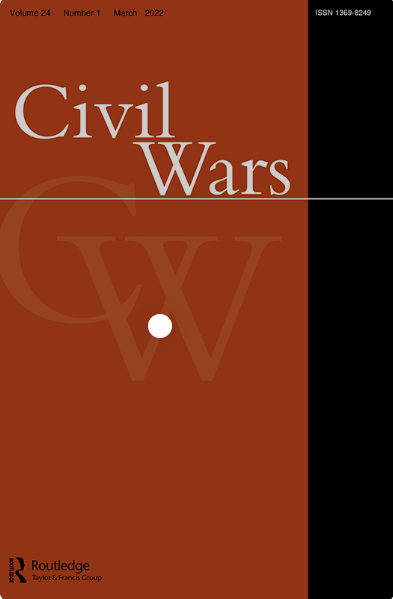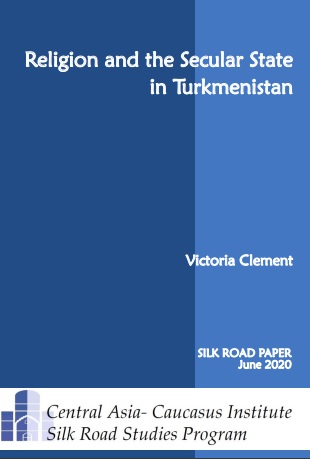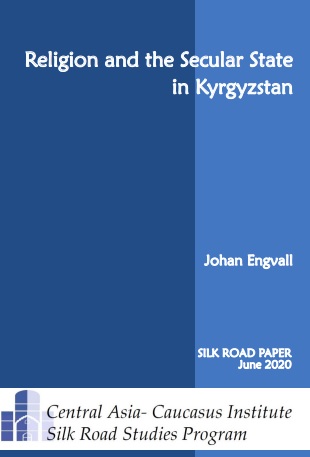The New Secularism in the Muslim World: Religion and the State in Central Asia and Azerbaijan

Religion as a Factor in Caucasian Conflicts
Svante E. Cornell
Civil Wars,
Vol. 1 no. 3, 1998
 The many conflicts that have raged in the Caucasus since the end of the 1980s have often been depicted in the media and academia as basically religous in character. The religious differences between parties to conflicts are empjasized and often exaggerated. In particular, the Caucasus has been taken as an example of the 'clash of civilzations' supposedly under way. This article seeks to challenge this perception of the Caucasian conflicts, arguing that religion has played a limited role in conflicts that are actually ehnopolitical and territorial in character. The article argues that seldom are religious bodies of thinking used to legitimize conflict behaviour in this region -- there has been no Jihad in the Caucasus, for example -- nor has the politicization of the parties to a conflict been underpinned primarily by religious identity or theological perspetives. As such, religious conflict can not be spoken of. Furthermore ther has occured no rallying of outside powers along religious lines; quite to the contrary empirical evidence shows hat religious has had little impact -- especially when compared to ethnicity -- in the international ramifications of these conflicts.
The many conflicts that have raged in the Caucasus since the end of the 1980s have often been depicted in the media and academia as basically religous in character. The religious differences between parties to conflicts are empjasized and often exaggerated. In particular, the Caucasus has been taken as an example of the 'clash of civilzations' supposedly under way. This article seeks to challenge this perception of the Caucasian conflicts, arguing that religion has played a limited role in conflicts that are actually ehnopolitical and territorial in character. The article argues that seldom are religious bodies of thinking used to legitimize conflict behaviour in this region -- there has been no Jihad in the Caucasus, for example -- nor has the politicization of the parties to a conflict been underpinned primarily by religious identity or theological perspetives. As such, religious conflict can not be spoken of. Furthermore ther has occured no rallying of outside powers along religious lines; quite to the contrary empirical evidence shows hat religious has had little impact -- especially when compared to ethnicity -- in the international ramifications of these conflicts.
CACI releases Silk Road Papers on State and Religion in Kyrgyzstan and Turkmenistan
Religion and the Secular State in Central Asia: The Examples of Kyrgyzstan and Turkmenistan

This event marked the publication of two Silk Road Papers on the state-religion relationships in Central Asia, a study of Kyrgyzstan by Johan Engvall and one on Turkmenistan by Victoria Clement. This forms part of the ongoing research effort on secular governance, religion and politics at the Central Asia-Caucasus Institute & Silk Road Studies Program Joint Center, and follows the publication of studies on Azerbaijan, Kazakhstan and Uzbekistan.
Johan Engvall’s study of Kyrgyzstan’s experience is timely given that country’s experience, starting with a more permissive atmosphere that subsequently aligned itself with policies in the rest of the region. Victoria Clement’s study of Turkmenistan is the first treatment of the subject to appear in print, and sheds light on the similarities of Turkmenistan’s approach with the rest of Central Asia as well as its specificities.
Speakers:
Victoria Clement, Eurasia Regional Analyst, Center For Advanced Operational Culture Learning, Marine Corps University
Johan Engvall, Senior Research Fellow, Foreign Policy Research Institute
Moderator: Svante E. Cornell, Director, Central Asia-Caucasus Institute at AFPC
When: Monday, June 15, 2020 at 10am EDT
The Event was live-streamed on our Facebook page and is available on our YouTube page and here.
Religion and the Secular State in Turkmenistan
Central Asia-Caucasus Institute & Silk Road Studies Program
Silk Road Paper
June 2020
Since gaining its independence from the Soviet Union in 1991, Turkmenistan has seen an increased presence of religion in everyday life. Islam has been a continuous cornerstone of Turkmen identity for centuries and is even more so in the post-Soviet period. Turkmeniçilik (Turkmen identity) and Musulmançilik (Muslim identity) are correlated.
Similar to what is found in several Central Asian countries, Turkmenistan distinguishes between traditional and non-traditional religious practices. In Turkmenistan, the state actively privileges a form of traditional Islam. That is, the leadership mobilizes the faith in its construction of a post-Soviet, national Turkmen identity. Yet, Turkmenistan is an officially secular country with constitutional provisions for the separation of state from religion. What does this mean for religious practice in that Muslim-majority country? What is the role of the state in mobilizing religious practices even as it curtails others? And why are there so few external influences on worship in Turkmenistan?
Turkmen were historically a nomadic people that began to adopt Islam as they migrated westward in the 9th and 10th centuries. Yet Islam is a religion that has tended to flourish in urbanized societies that could establish formal institutions like mosques and madrasas. Turkmen created intensive and rich religious practices, but those were often mixed with pre-Islamic practices or honed to suit the nomadic lifestyle. Nevertheless, this did not diminish the importance of religion in Turkmen culture and Islam came to be a key marker of Turkmen identity.
Today, that culture, including Islam as a key facet, contributes to the Turkmen national identity. The state encourages the conceptualization of “Turkmen Islam,” or worship infused with veneration of elders and saints, life-cycle rituals, and Sufi practices. Yet, it discourages external influences in most spheres of life, resulting in a limited foreign religious presence. TheConstitution’s claims to uphold a secular system in which religious and state institutions are separate. Nevertheless, examples of state interference in religious matters abound.
While Turkmenistan’s initial years of independence saw an increase in religious practices and the development of institutions like the Muftiate and the building of mosques, today it is more regulated. Still, the government leadership uses Islam to legitimize its role by sponsoring holiday celebrations such as iftar dinners during Ramadan or presidential pilgrimage to Mecca, Saudi Arabia. This sponsorship has validated the country’s two presidents (Nyýazow and Berdimuhamedow) as pious Turkmen, giving them an aura of cultural authority. In these ways, the government promotes a singular form of “Turkmen Islam” that is tightly bound to national identity and makes use of religious symbols to reinforce the concept of the nation-state.
In light of this, this study aims to shed light on the relationship between state, religion, and society in Turkmenistan, highlighting the model of secular governance the state observes even as it embraces Islam as part of national identity project.
Religion and the Secular State in Kyrgyzstan
Central Asia-Caucasus Institute & Silk Road Studies Program
Silk Road Paper
June 2020
Since independence, religion has become ever more important as an identity marker in Kyrgyzstan, with increased practical relevance in the everyday lives of many citizens. This religious revival poses challenges for a state that, like the other Central Asian states, has remained secular after the fall of communism. For this Muslim-majority state, the challenge has been to sustain the secularism of the state that was instituted during Soviet times, while replacing the anti-religious prejudice that characterized the militantly atheist socialist system with tolerance and respect for all religions. How has this played out in the past three decades?
In the early years of independence, the government took a liberal approach to religion, and the number of mosques and religious schools expanded rapidly. Foreign sources of religious influences, including ideological and financial, met few restrictions and could flow into the country from Saudi Arabia, Turkey and the Indian Subcontinent. By its fifth anniversary of independence, the number of mosques in Kyrgyzstan had already grown to more than 1,000, and the burst of mosque-building has continued unabated since then, standing at 2,669 officially registered mosques by 2016. Kyrgyzstan counts far more Islamic educational institutions than its larger neighbors Kazakhstan, Tajikistan and Uzbekistan.
Meanwhile, many Evangelical missionaries arrived in Kyrgyzstan in the 1990s in order to attract converts to various Christian churches. Protestant denominations from Europe, North America and South Korea played a particularly active role and thrived under the liberal religious environment of the 1990s. Since the beginning of the 2000s, however, foreign missionaries became subject of stricter controls effectively halting their expansion.
While Kyrgyzstan’s first decade of independence was characterized by a liberal approach to the sphere of religion, measures have thereafter been taken to strengthen the government’s regulatory powers and take a less neutral and more proactive approach to religious matters. First, Kyrgyzstani laws and policies separate between what is referred to as traditional faiths, on the one hand, and non-traditional faiths on the other. The former – Hanafi Islam and the Russian Orthodox Church – are prioritized and given preferential treatment due to their historical influence on the development of Kyrgyz statehood. In particular, support of official Hanafism has attracted increasing policy attention. The government has taken upon itself the task to promote and safeguard the traditions and principles of Hanafism in order to stem the influence of international Salafist movements in the country and to ensure the cohesion of society. The distinction between beneficial religious traditions and allegedly harmful versions of religion has become an increasingly central part of the relationship between the secular state and religious communities.
Second, the government has instructed the chief religious institutions – the nominally independent Muftiate and the State Commission for Religious Affairs – to provide better control and monitoring of religious organizations, but also to engage in closer cooperation with them. State intervention into the activities of religious institutions is mainly justified on the grounds of preventing religious extremism. For example, the hardened legislation introduced in the religious sphere in 2008 was intended to restrict the activities of extremist foreign religious organizations, such as the banned global Islamist movement Hizb-ut-Tahrir.
The Islamic extremist threat first emerged on Kyrgyzstan’s political agenda in the late 1990s among growing fears that radical Islamic groups had established a presence in the religiously more conscious southern part of Kyrgyzstan. The threat became real in the summers of 1999 and 2000 when the Islamic Movement of Uzbekistan carried out armed incursions into southern Kyrgyzstan. Isolated terrorist incidents inside the country as well as radicalized citizens from Kyrgyzstan travelling to fight for the Islamic State and other jihadist groups in Syria have ensured that religious extremism and terrorism remain central factors in forming government policy in the religious field.
Kyrgyzstan’s political project of secularism has had to confront and adjust to an increasingly diversified religious situation. The country’s first president, Askar Akayev, initially took a rather laissez-faire approach to religion, while eventually driving state policy more in the direction of sheltering state and society from unwanted religious influences. His successor, Kurmanbek Bakiyev, continued and strengthened these policies as he mostly paid attention to Islam as a potential threat. While the third president, Almazbek Atambayev, was highly suspicious of foreign Islamic traditions, he endorsed traditional Kyrgyz Islam in public in a much more pronounced manner than his predecessors. Current president Sooronbai Jeenbekov appears intent on taking this rapprochement further by fostering a partnership between political and religious leaders.
In simple terms, three main attitudes can be identified in contemporary Kyrgyz society. First, there is the predominantly secular political, economic and intellectual elite in Bishkek. This once dominant group is gradually losing its position in a less secular society. Second, there is a large group of nationalist-minded Kyrgyz citizens who increasingly embrace moderate Hanafi Islam as part of that identity. Third, there are Islamic currents whose representatives try to convert existing Muslims to more conservative versions of Islam. It can be assumed that the relatively strong support for Sharia in Kyrgyzstan, reported in certain survey data, is located chiefly among this group.
Despite the fact that religious organizations are prohibited from interfering in the government of the state, Islam has become an increasingly potent factor in politics. As society has become more religious, Islam has become an important source of legitimization for politicians and a resource for the mobilization of voters. In the early years of independence, the rapid increase of mosques was largely the result of foreign investments, the continued proliferation is now mainly secured through the financial prowess of local sponsors, including members of parliament. This is a reciprocal relationship. Clerics use their political connections to build up their own power bases. Politicians, in turn, enjoying clerical support strengthen their local electoral base.
In this light, Kyrgyzstan stands at a crossroads; sooner or later there will be a power shift away from the Soviet generation that has governed the country since independence. The question is, what comes with a new generation in power, and whether a post-Soviet generation of leaders will maintain the separation between politics and religion. Much depends on which of the three above-mentioned groups will constitute the backbone of future decision-makers.



